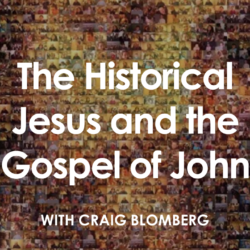This is part 11 of the Read the Bible For Yourself.
The Gospels are evangelistic biographies of Jesus. In today’s episode you’ll learn the basic storyline of the four biblical Gospels: Matthew, Mark, Luke, and John. Then we’ll go through them from shortest to longest to see how each brings a unique and helpful perspective in telling the life of Christ. We’ll also hit some important concepts like the kingdom of God, parables, and the word of God. Lastly, we’ll ask about application. How can you figure out which sayings of Christ apply to you today and which ones do not?
Listen to this episode on Spotify or Apple Podcasts
—— Links ——
- See other episodes in Read the Bible For Yourself
- Other classes are available here, including How We Got the Bible, which explores the manuscript transmission and translation of the Bible
- Get the transcript of this episode
- Support Restitutio by donating here
- Join our Restitutio Facebook Group and follow Sean Finnegan on Twitter @RestitutioSF
- Leave a voice message via SpeakPipe with questions or comments and we may play them out on the air
- Intro music: Good Vibes by MBB Attribution-ShareAlike 3.0 Unported (CC BY-SA 3.0) Free Download / Stream: Music promoted by Audio Library.
- Who is Sean Finnegan? Read his bio here
—— Notes ——
The Four Gospels
- Matthew, Mark, Luke, and John
- Gospel = good news
- The Gospels are biographies about Jesus which seek to convince readers about the good news that he is the Messiah.
Basic Storyline of the Gospels
- Birth narratives
- John’s ministry
- John baptizes Jesus.
- Jesus calls the twelve.
- Teachings of Jesus
- Miracles of Jesus
- Conflict with critics
- Triumphal entry
- Intensified conflict
- Last supper
- Arrest, trial, execution
- Resurrection appearances
- Great commission
Mark (11,305 words)
- Papias: “And the elder used to say this: ‘Mark, having become Peter’s interpreter, wrote down accurately everything he remembered, though not in order, of the things either said or done by Christ. For he neither heard the Lord nor followed him, but afterward, as I said, followed Peter, who adapted his teachings as needed but had no intention of giving an ordered account of the Lord’s sayings. Consequently Mark did nothing wrong in writing down some things as he remembered them, for he made it his one concern not to omit anything that he heard or to make any false statement in them.’”[1]
John (15,633 words)
- Purpose statement: John 20:30-31
30 Now Jesus did many other signs in the presence of his disciples that are not written in this book. 31 But these are written so that you may continue to believe that Jesus is the Messiah, the Son of God, and that through believing you may have life in his name.
Matthew (18,348 words)
- Five blocks of teaching
- 5-7 Sermon on the Mount
- 10 Missionary Instruction
- 13 Parables of the Kingdom
- 18 Discourse on the Church
- 24-25 Olivet Discourse
Luke (19,483 words)
- Luke’s method: Luke 1:1-4
1 Since many have undertaken to compile a narrative about the events that have been fulfilled among us, 2 just as they were handed on to us by those who from the beginning were eyewitnesses and servants of the word, 3 I, too, decided, as one having a grasp of everything from the start, to write a well-ordered account for you, most excellent Theophilus, 4 so that you may have a firm grasp of the words in which you have been instructed. - Luke’s historical precision: Luke 3:1-2
1 In the fifteenth year of the reign of Tiberius Caesar, when Pontius Pilate was governor of Judea, and Herod was ruler of Galilee, and his brother Philip ruler of the region of Ituraea and Trachonitis, and Lysanias ruler of Abilene, 2 during the high priesthood of Annas and Caiaphas, the word of God came to John son of Zechariah in the wilderness.
The Synoptic Gospels
- Matthew, Mark, and Luke
- Matthew and Luke quote Mark extensively.
- Both quote another source of sayings as well.
- Still, much of Matthew and Luke is unique to them.
- Fee & Stuart: “Take, for example, the fact that there is such a high degree of verbal similarity among Matthew, Mark, and Luke in their narratives, as well as in their recording of the sayings of Jesus. Remarkable verbal similarities should not surprise us about the sayings of the one who spoke as no one ever did (John 7:46). But for this to carry over to the narratives is something else again—especially so when one considers (1) that these stories were first told in Aramaic, yet we are talking about the use of Greek words; (2) that Greek word order is extremely free, yet often the similarities extend even to precise word order; and (3) that it is highly unlikely that three people in three different parts of the Roman Empire would tell the same story with the same words—even to such minor points of individual style as prepositions and conjunctions.”[2]
- Fee & Stuart: “The best explanation of all the data is …that Mark wrote his gospel first, probably in part at least from his recollection of Peter’s preaching and teaching. Luke and Matthew had access to Mark’s gospel and independently used it as the basic source for their own. But they also had access to all kinds of other material about Jesus, some of which they had in common. This common material, however, is scarcely ever presented in the same order in the two gospels, a fact suggesting that neither one had access to the other’s writing. Finally, John wrote independently of the other three, and thus his gospel has little material in common with them. This, we would note, is how the Holy Spirit inspired the writing of the Gospels. …[W]ith the Spirit’s help, they creatively structured and rewrote the materials to meet the needs of their readers.”[3]
Kingdom of God
- Understanding what Jesus meant by the kingdom of God is critical
- Fee & Stuart: “[T]he major hermeneutical difficulty lies with understanding “the kingdom of God,” a term that is absolutely crucial to the whole of Jesus’ ministry…”[4]
- Likely, Jesus was pulling from Daniel who prophesies extensively about God’s kingdom coming to earth (Dan 2:44; 7:26-27)
Parables
- Short fictional stories that make a point
- Get the main point; don’t get lost in trying to find a meaning for every aspect of the story.
- Jesus told some parables to hide truth from those who didn’t want it.
- He told others to teach his disciples important truth simply and effectively.
- Still others, he told as zingers to confront his critics.
Word of God
- The Bible does not typically call itself “the word”.
- “The word” is the message Jesus preached to repent due to the coming Kingdom.
- He wasn’t telling his Jewish listeners to repent and believe in the Bible, since they already believed in it.
- Compare Mark 4:13-15; Luke 8:11-12; Mat 13:19
- Word = word of God = word of the Kingdom
Application
- Must discern between the sayings Jesus limited to the people in front of him at that time and those that remain applicable to all his followers today
- Mat 10:9-11 tells his disciples not to carry any money with them. Does that mean true Christians don’t use money and just mooch off their neighbors?
- Luke 6:27-28 tells us to love our enemies, a commandment repeated in Mat 5:43-48; Rom 12:17-21; 1 Pet 3:9-11 and exemplified by Jesus’ actions.
Review
- The NT begins with four evangelistic biographies of Jesus called Gospels.
- Mark is the shortest Gospel. Its action-packed narrative is probably derived from Peter’s recollections as well as God’s direction via his spirit.
- John is the most theologically developed, and it contains monologues where Jesus talks about himself and his relationship to his Father.
- Matthew showcases Jesus as a Rabbi who teaches his followers how to live in light of the Kingdom of God.
- Luke was a careful historian who made an effort to present a “well-ordered account” to present the life of Christ to a noble Roman audience.
- The Kingdom of God is the core of Jesus’ message and ministry. It refers to a coming age when God sets everything wrong with the world right.
- Jesus’ favorite self-title was “Son of Man,” which could either mean a human being or the ruler of the coming Kingdom.
- Parables are short fictional stories told to make a point.
- In the Gospels, the “word” refers to the message Jesus preached about the Kingdom of God, not the Bible in general.
- Although it’s hard to be sure, most think Matthew and Luke used Mark as a source as well as another sayings source.
- In order to discern what sayings of Jesus apply to you, consider the circumstances in which they were given, whether other parts of the NT repeat the statement, and what Jesus’ example can tell you.
[1] Fragments of Papias 3.15 in Apostolic Fathers, trans. Michael Holmes, 3rd ed. (Grand Rapids, Baker Academic, 2007).
[2] Gordon D. Fee and Douglas Stuart, How to Read the Bible for All Its Worth (Grand Rapids, MI: Zondervan, 2014), 141.
[3] Stuart, 142.
[4] Stuart, 132.






